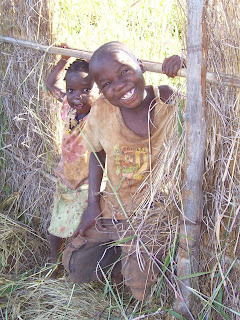A day working at Orphans Unlimited in Mozambique began at 5:00 a.m. sharp. I lived in a bunkhouse with other female workers, who ranged from age 18 to 75. We arose before the sun had risen so we relied on solar powered lights to get ready. Breakfast was served at 5:30 a.m. and if you missed it well, you missed a meal. The meal consisted of bread but weekends french toast or pancakes were made which was a great treat! I was highly impressed with the meals Linda Stanley, our cook, prepared with her limited resources in the African bush.
Midmorning consisted of working on projects for Orphans Unlimited. Primarily the corn and bean processing was occurring during my stay. Danielle, Melissa and I were the summer team and we assisted with providing the yearly food supply to the orphanage. The work was long, hot and dirty it was vital to the widow's food program and orphan's meals. We would work until 11:30, lunch time. Meals included rice, beans, fresh vegetables, fruits and any leftovers from previous meals.
The hottest time of the day occurred after lunch so we would usually work indoors or rest until afternoon activities commenced. I would usually write letters and read until 1:00. Each afternoon varied depending on the day. Saturdays included trips to the local market, Monday, Wednesday and Friday were preschool class, Tuesdays I conducted an English class, Thursday was food distribution day and Sunday was the prayer walk. Life eventually became a routine that was centered around the needs of the children and Balama village. My favorite days were spent teaching English lessons and exploring the local market.
However, one consistency was activities time. At 3:00 p.m. every day we played games and sports with the orphans (the children would find us if we were not timely!) They enjoyed basketball and soccer the most while I was able to teach them how to use frisbees. I also introduced them to American games such as 'duck duck goose', 'simon says', and 'red rover, red rover.' There was a language barrier as most Mozambiquans speak Portuguese primarily. The children always wanted to teach me words in their tribal language of Macoa and they enjoyed a good-natured laugh at my expense. By 4:30 we had to depart the recreational fields for supper.
Each week we rotated as kitchen help for Linda. During one of my weeks I helped make goat enchiladas, one of my favorite meals in Mozambique! After supper everyone would return to their bunk houses as it got dark quickly at around 6:00 p.m. In third world country life becomes much more quite when the natural light disappears as there is no electricity. I was very glad the orphanage facilities had solar powered lights. Bedtime approached 7:30 p.m. which I would have never considered in my lifestyle at college! Showering at night was interesting without running water. Buckets of water from the well were heated on a gas stove. Bathing consisted of washing oneself with washcloth and bucket of water. I packed plenty of toiletries as I knew there would be no replacements in Mozambique!
In all, there was nothing "typical" about Mozambique. Each day brought a new adventure, which I tried to capture with my camera. The children adored having their photos taken. However, it did become a problem when they would nearly mob you for their picture. The children do not have access to a mirror so they literally do not know what they look like. (Also, there are no large water sources in the area so even viewing their reflection was not an option.) So, when I was being a tourist the children were only too eager to have their photo taken. I know I will look back on my photos and always treasure my time in Africa.
Sleeping arrangements include mosquito netting over beds to prevent from insects.
Laundry is washed and dried outside by local women. Orphans Unlimited offers job opportunities to the Balama community through services such as guards, tailors and drivers.
Weekly English lessons are given to Nelson and Bertino (pictured) and Junior. (Nelson's brother.) Nelson aspires to be an English translator in Mozambique where Portuguese is the national language.
Saturdays are market days where produce is purchased for the weekly food menu.
A typical Mozambiquan home made of mud bricks and grass rooftops. Multiple family generations will live in one hut.
All water is pumped by hand from a well and filtered before it is safe to drink. (The average well costs $10,000 to construct.)
Preschool is held three days a week during the afternoons by Madelenia and Carlitos George (pictured teaching a lesson.)
On Wednesdays preschoolers line up in their uniforms where they learn colors, numbers and color.
Thursdays are food distribution day where local women are given weekly rations of household supplies. Many families rely on the stipend which is based on need and family size.
A widow, who cares for dormitory orphans, is given her bean allotment. She will also receive firewood, soap, corn and medicines.
The typical method to carry items in Mozambique is on your head! From a young age (5 years) children are taught how to carry heavy loads 'headfirst'.
Each afternoon between 3:00-5:00 pm children gather at the soccer field for games.
Most children go barefoot in Mozambique. (Not by choice.)
A typical sunday school class includes 130 children!
"Bush churches" are located on the outskirts of large villages and serve rural populations. Multiple bush churches have opened since Orphans Unlimited began.
Church services are colorful experiences filled with music, dancing and even drums in the congregation!
Sunday school averages 130 children, who are given a sucker at the end for good behavior.
Women's ministry class is held Sunday afternoons followed by a prayer walk to visit the sick.














































